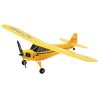Hi,
It could very well be possible to run a DC motor at a very slow speed using feedback. Funny though, the feedback might have to be geared UP. But there is a chance that it could overheat the motor too unless it was only to be used in a non continuous way. Many things are rated for low duty cycle so that would just be classed in that group, unless we get lucky and the motor doesnt overheat.
Im not sure if you could use 'normal' simple feedback like the back EMF technique, because the motor would be going so slow that it would only rotate once every three seconds. I dont think that's enough to generate appreciable back EMF. Connected to a gear box that gears the motor UP and then connected to another motor, that second motor would provide enough back EMF but then we had to use a gearbox anyway (although a light duty one now instead of one that has to take the full load torque).
So gearing down is probably the best bet, unless you can move to a different kind of motor like a stepper, and a new drive circuit.
There are a lot of ways to 'gear down'. Pulleys, sprocket/chain, standard gears, worm gears, etc. For very low RPM the best bet is to buy something already made. Check out RobotShop for example.


